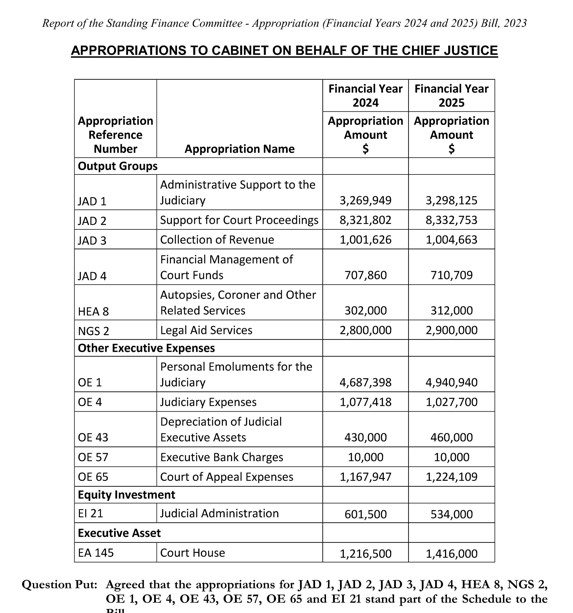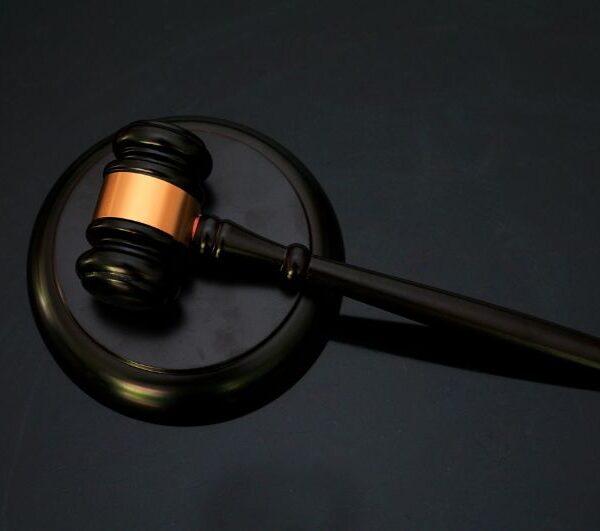
Courts Must Be Financially Independent Of The Legislature
|
Getting your Trinity Audio player ready...
|
By Alric Lindsay
According to the Cayman Islands Constitution, “The Legislature and the Cabinet shall uphold the rule of law and judicial independence, and shall ensure that adequate funds are provided to support the judicial administration in the Cayman Islands.” This seems problematic because the financial appropriations required by the judiciary to carry out its functions should not be influenced by political considerations. In addition, as long as the Courts rely on the Legislature or the Finance Committee to approve appropriations, governance (in particular, independence) will be threatened.
Details of political appropriations
An example of political approval of appropriations is the Report of the Standing Finance Committee – Appropriation (Financial Years 2024 and 2025) Bill, 2023, the contents of which were approved in the Standing Finance Committee meeting held on December 14, 2023. In this case, the Finance Committee approved appropriations to the judicial administration of just over $25 million in 2024 and about $26 million in 2025.
In addition to the Courts’ normal operations, Mrs. Suzanne Bothwell, Courts Administrator & Chief Officer of the Judicial Administration, explained in the December 2023 Finance Committee meeting that some of these appropriations were necessary for repairs to the roof on the main court building, cosmetic work to the exterior of the court buildings, upgrading electrics, and increasing the Courts’ generator capacity as an emergency service.
Mrs Bothwell added:
We are not at this stage going to be building out additional new courtrooms, but we will be upgrading, for example, the main court building, courtrooms one and two.
We are seeking to facilitate those courts becoming digital courts, whereby we can facilitate digital trial management instead of the hard copy bundles and audio recordings, etcetera. So that will require some significant works, but it wouldn’t be at the scale of introducing new core buildings.

If the Courts were faced with these types of expenses in the future but the Legislature limited the appropriations to the Chief Justice, it could be challenging for them to achieve necessary upgrades to enhance Court services and operations or, worse, to conduct cases properly.
To avoid this scenario, it seems better for the Court to control its appropriations and not have these subject to political considerations.
For those who ask how the Courts could make money without a Legislature-approved appropriation process, the Courts could continue to earn income from fines, penalties, and document filing fees. In addition, they could earn money from large asset forfeiture and seizure cases involving money laundering or terrorist financing. Lastly, the Courts could bill the Government each year for the public function they perform.
Without the Courts having full control over appropriations in this way, significant threats could arise regarding the idea of separation of powers and the ability of the judiciary to operate independently.
Other independence-related concerns
In addition to financial independence, there are also instances where the Court should be able to strike down legislation made by the Legislature. One example is when the Court finds that a legislative provision breaches any provision of the Bill of Rights under the Cayman Constitution.
This is important because, at the moment, the Cayman Constitution only allows the Courts to say that offending legislation is incompatible.
Specifically, the Cayman Constitution states:
23. (1) If in any legal proceedings primary legislation is found to be incompatible with this Part, the court must make a declaration recording that the legislation is incompatible with the relevant section or sections of the Bill of Rights and the nature of that incompatibility.
(2) A declaration of incompatibility made under subsection (1) shall not constitute repugnancy to this Order and shall not affect the continuation in force and operation of the legislation or section or sections in question.
(3) In the event of a declaration of incompatibility made under subsection (1), the Legislature shall decide how to remedy the incompatibility.
This mechanism is not ideal because it means that the country must wait until the Legislature decides how and when to remedy the incompatibility.
A better outcome for the people of the Cayman Islands would be if voters considered an amendment to the Cayman Constitution to allow the Courts to void any provision of legislation that breaches the Bill of Rights (i.e., not just make a declaration of incompatibility). After all, the Cayman Constitution is deemed the highest authority in the country that people count on to protect their rights.
Takeaways
It is crucial that the Courts in the Cayman Islands are adequately funded and insulated from political influence to safeguard judicial independence and ensure the effective administration of justice. A constitutional amendment and restructuring where the judiciary is responsible for its appropriations would help protect the courts from external pressures and uphold the principles of judicial independence and separation of powers.
Without this independence and in the absence of additional powers of the Courts to void any part of legislation that breaches constitutional rights, it may be challenging for the judiciary to effectively safeguard people’s constitutional rights or achieve optimum effectiveness in upholding the rule of law.
Implementing complete financial independence for the judiciary may also strengthen the Cayman Islands legal system and maintain public trust in the justice system.
For these reasons, immediate steps should be taken to make the judicial administration’s financial appropriations fully independent of the Legislature, i.e., not subject to “political approval.”





